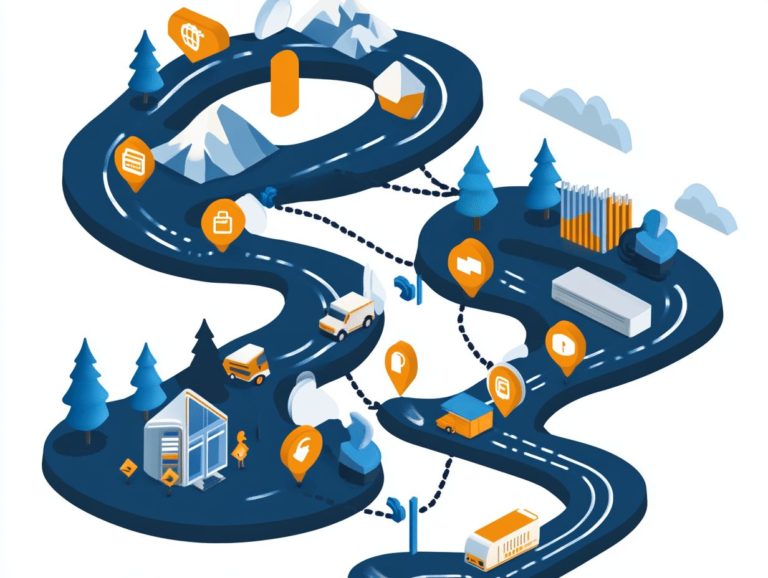Strategies for Effective CRM Project Management
In today’s fast-paced business landscape, you understand that effective Customer Relationship Management (CRM), which means managing interactions with customers, is crucial for nurturing strong client connections and driving growth.
To implement a successful CRM strategy, careful project management is essential. Let’s explore the key elements that underpin a successful CRM project, including strategic planning, team collaboration, resource allocation, and budgeting.
You ll uncover common challenges and best practices, as well as tools that can significantly enhance your efficiency. Dive in to explore the essentials of mastering CRM project management and maximizing your results.
Contents
- Key Takeaways:
- Key Elements of Successful CRM Project Management
- Common Challenges in CRM Project Management
- Best Practices for Effective CRM Project Management
- Tools for CRM Project Management
- Frequently Asked Questions
- What are some key strategies for effective CRM project management?
- How important is communication in CRM project management?
- What role does research and analysis play in CRM project management?
- How can proper resource allocation impact the success of a CRM project?
- What are some challenges that can arise during CRM project management?
- Why is continuous monitoring and evaluation important in CRM project management?
Key Takeaways:

- Plan carefully and set clear goals to make your CRM project a success!
- Team collaboration and communication are vital in successful CRM project management.
- Identifying and addressing roadblocks is crucial for overcoming common challenges in CRM project management.
What is CRM and Why is Project Management Important?
Customer Relationship Management (CRM) is all about the strategies, practices, and technologies you use to manage and analyze your interactions with customers throughout their journey. This approach enhances personalized communication and helps build better relationships.
Effective project management is key to implementing your CRM strategies, and understanding the benefits of CRM for project management can help you meet your business goals while optimizing customer experience and engagement.
Leverage CRM to track customer preferences, customize your marketing efforts, and respond swiftly to inquiries reinforcing loyalty and trust in the process. The way CRM tools and project management work together not only streamlines your workflows but also aligns your teams with overarching objectives aimed at maximizing customer satisfaction.
In doing so, you can create targeted campaigns that truly resonate with individual clients, fostering long-term relationships. Effective project management guarantees that your CRM initiatives are executed on time and within budget, ensuring that enhancements to customer experience positively impact engagement metrics and overall business performance.
Key Elements of Successful CRM Project Management
Successful CRM project management depends on key elements that ensure your initiatives are implemented effectively and optimized for customer engagement. Understanding the role of a project manager in CRM projects is crucial, as these initiatives should seamlessly align with your broader business goals.
Key components include:
- Careful planning and goal setting
- Cultivating collaboration and communication among your teams
- Ensuring proper resource allocation and budgeting
Each of these factors plays a vital role in crafting an efficient CRM strategy that enhances customer satisfaction and retention, ultimately paving the way for increased sales growth.
Planning and Goal Setting
Planning and goal setting are essential pillars of a successful CRM strategy, creating a solid foundation for effective customer data management. This process enables you to clearly define your objectives and expected outcomes.
By establishing a well-defined roadmap, you can pinpoint your target customers while ensuring that your CRM initiatives are in sync with your overarching business goals. This alignment shapes the development and implementation of strategies that enhance customer engagement and drive growth.
Employing techniques such as analytics dashboards and gathering customer insights provides you with vital data that informs your decisions, allowing you to set measurable goals.
By tracking performance metrics, you can adjust your tactics in real-time, ultimately refining your approach to better meet customer needs and achieve your desired outcomes more efficiently.
Team Collaboration and Communication

Effective team collaboration and communication are crucial for the success of your CRM project management. Use various CRM tools and communication channels to streamline processes and improve customer interactions.
When your teams operate cohesively, they can exchange valuable insights and strategies that enhance the customer experience. For example, using tools like Slack or Microsoft Teams enables real-time discussions, ensuring everyone remains aligned and informed.
Collaboration between departments allows your marketing, sales, and customer service teams to share invaluable feedback that refines your CRM strategies. By fostering a culture of open dialogue and leveraging technology for collaboration, you can significantly boost customer engagement and satisfaction.
This sets the stage for building loyal customers who will stick with you!
Resource Allocation and Budgeting
Resource allocation and budgeting are essential components of your CRM implementation, shaping how effectively you can deploy your resources to optimize the sales pipeline and enhance customer service.
Strategically allocating both financial and human resources ensures that crucial elements, such as CRM software, training, and necessary tools, receive the funding they need.
This thoughtful investment streamlines your processes and cultivates an environment where your employees are well-equipped to deliver exceptional service.
Effective budgeting helps prioritize these elements, allowing your organization to adapt and evolve in response to customer needs.
Ultimately, a well-structured budget acts as a roadmap, guiding your projects toward successful outcomes while significantly boosting overall customer satisfaction.
Common Challenges in CRM Project Management
Despite its ability to elevate customer relationships and fuel business success, CRM project management frequently faces challenges that can stall progress and obstruct seamless integration.
Recognizing and tackling these obstacles is crucial for the success of your CRM initiatives and for sustaining high levels of customer satisfaction.
Identifying and Addressing Roadblocks
Identifying and addressing roadblocks in your CRM implementation is essential for maintaining strong customer satisfaction. This ensures that your engagement strategies are not just effective but perfectly aligned with your business goals.
Several factors can impede the smooth execution of your CRM project. You might encounter data quality issues that lead to inaccurate insights, a lack of personnel training resulting in underutilization of the system, or insufficient integration with your existing technologies, which can hinder seamless operations.
Recognizing these challenges early on is crucial. It involves conducting regular audits of data integrity, providing comprehensive training programs for employees, and ensuring that your CRM system is fully compatible with the tools you already use.
By systematically identifying these obstacles and developing actionable solutions, you can significantly enhance your CRM outcomes and cultivate deeper, more meaningful relationships with your customers.
Best Practices for Effective CRM Project Management

Embracing best practices in CRM project management can profoundly elevate your customer engagement and the overall effectiveness of your CRM strategies. Incorporating tips for effective lead management in CRM fosters improved retention rates and drives meaningful sales growth.
Tips for Streamlining Processes and Maximizing Results
Streamlining processes is crucial for maximizing results in CRM project management. This enables your organization to respond swiftly to customer behaviors and needs while harnessing CRM tools to their fullest potential.
By automating repetitive tasks, your teams can reclaim valuable time. This allows them to concentrate on cultivating stronger customer relationships.
Using analytics enables you to make informed, data-driven decisions that can significantly enhance the customer experience.
Optimizing communication channels ensures that interactions are timely and relevant. This creates a sense of personalized service that customers appreciate.
When you execute these strategies well, they pave the way for more meaningful customer interactions. Ultimately, this boosts satisfaction levels and loyalty.
Focusing on these improvements transforms the way your business engages with clients, driving both efficiency and positive outcomes.
Tools for CRM Project Management
Discover how the right CRM tools can supercharge your efficiency!
By equipping yourself with the capabilities needed to manage customer relationships effectively, you set the stage for implementing successful marketing automation strategies that drive results.
Software and Platforms to Enhance Efficiency
Using the right CRM software and platforms is essential for enhancing efficiency in your project management endeavors. By ensuring seamless user adoption, you can maximize the value derived from CRM features that help with daily operations.
These systems do more than just organize customer interactions; they foster better collaboration among your team members, resulting in a more cohesive project workflow.
Take Salesforce, for example. It offers robust automation tools and customizable dashboards tailored to your unique business needs, allowing you to track progress effectively.
Then there’s HubSpot, which elegantly integrates marketing and customer service tools into a single, cohesive platform, simplifying the user experience.
Such successful integrations reveal that an organized and streamlined approach can significantly enhance your organizational performance. This reduces project turnaround times and cultivates stronger customer relationships.
Frequently Asked Questions

What are some key strategies for effective CRM project management?
- Set clear goals and objectives.
- Communicate regularly with all stakeholders.
- Conduct thorough research and analysis.
- Allocate resources properly.
- Establish a strong project team.
- Continuously monitor and evaluate progress.
How important is communication in CRM project management?
Communication is crucial in CRM project management. It ensures that all stakeholders are on the same page and informed about project updates, progress, and potential issues.
What role does research and analysis play in CRM project management?
Research and analysis provide valuable insights into the market, customers, and competition. This information can help in creating a successful CRM strategy and identifying potential roadblocks that can be addressed proactively.
How can proper resource allocation impact the success of a CRM project?
Proper resource allocation is crucial for the success of a CRM project. It ensures that the project has the necessary support, budget, and tools to achieve its goals.
What are some challenges that can arise during CRM project management?
Some common challenges include a lack of alignment between the project and organizational goals, resistance to change from team members, inadequate resources or budget, and difficulty in integrating multiple systems and processes.
Why is continuous monitoring and evaluation important in CRM project management?
Continuous monitoring and evaluation allow project managers to track progress, identify potential issues, and make necessary adjustments to keep the project on track.
Ready to implement these tips and explore the tools discussed? Start transforming your CRM project management today!





